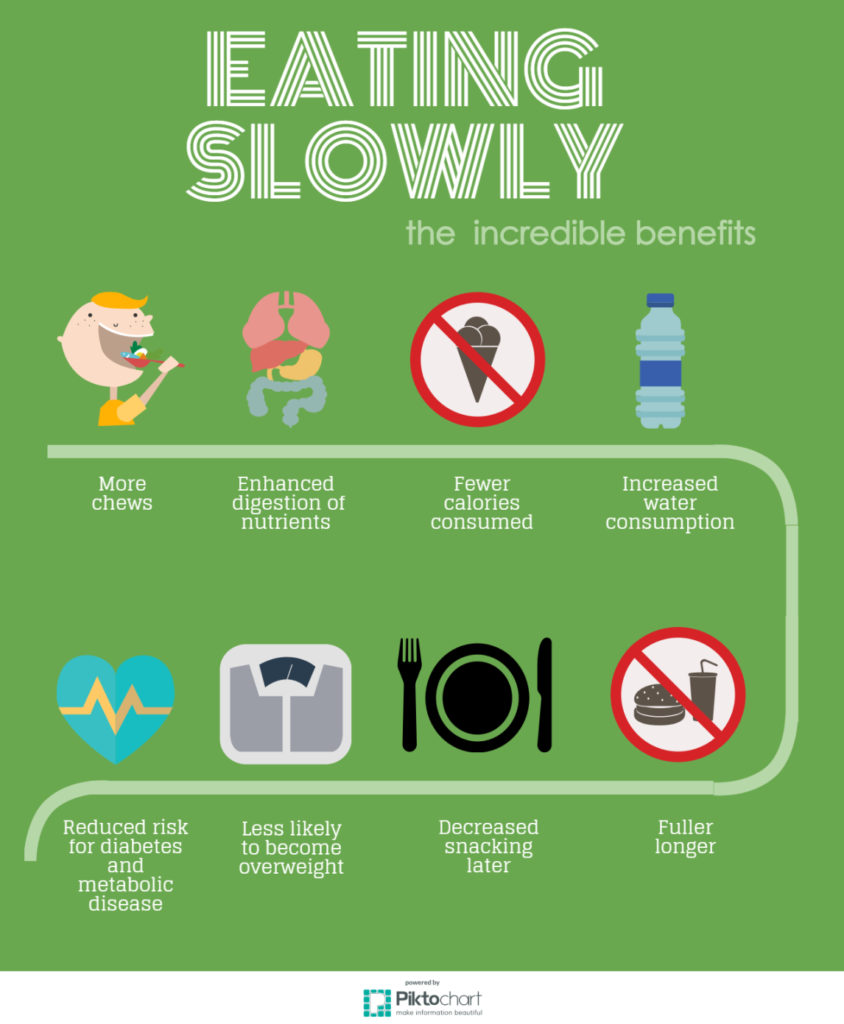
Have you ever thought about not just what you eat, but HOW you eat? Do you sit down, free of distractions, and chew each bite with intent? If not, you may find yourself over-eating, not fully digesting food, with heart burn, and possibly even at risk for diabetes and metabolic syndrome.The benefits of eating slowly are truly incredible. A 2013 Journal of the Academy of Nutrition and Dietetics study found that those who ate slower had reduced food intake by nearly 15%. That amounts to roughly 300 calories less per day! The slower you eat, the more time you give your hormones the ability to communicate with each other and decide that your body is sufficiently fueled. When we eat too quickly, Leptin, the hormone that keeps us full, cannot interact with other hormones such as Cholecystokinin, to increase the feeling of fullness, and with Dopamine, to produce the pleasurable feeling we get from eating foods we love. In fact, The Obesity Society Journal found that faster eating speed was associated with altered gut hormone responses and lead to greater calories consumed.Not only does eating slowly have an effect on your immediate meal, but it also suppresses hunger later on and improves digestion. A 2015 study by Ferriday and colleagues found that slower meal consumption increased fullness during the meal, at the end of the meal, and even 3 hours following the meal. Participants even remembered eating more during the meal when they ate slower. This can be especially helpful for those dieting and trying to consume fewer calories and snacks throughout the day. Eating slowly can be paramount in helping with weight loss, as well as prevention of diabetes and metabolic syndrome. A 2013 study found that fast eating rates were associated with greater risk of obesity and cardiometabolic risk factors in men (Lee et al., 2013). As you can see, eating slowly has innumerable health benefits. However, in our fast-paced culture and busy lives, it seems almost impossible to sit down, distraction-free for a meal, several times per day.Here are some tips to help you reap the rewards of eating slowly:
- Choose less processed ingredients: The more processed a food item, the less chewing typically involved. Instead, include fruits, vegetables, and lean meats that require more chewing.
- Make time for meal time: Devote 20-30 minutes for each meal to eat without distractions. Take this time to unwind and really enjoy the gift and taste of each bite. Limit using your cell phone, watching television, working, and driving or standing while eating.
- Drink more water: Between each bite, try to take a sip of water. This has been shown to not only increase water consumption throughout the day, but also leads to increased fullness earlier.
- Be patient: Eating slowly can greatly aid in helping your body feel full and satiated quicker than eating quickly. However, sometimes it takes our body longer to catch up. If this is the case, try being patient and giving your hormones time to communicate before adding more to your plate. It can take up to 20 minutes for your body to feel the effects of being full and satiated.
Next time you get ready to eat a meal, try incorporating these healthy habits to help you eat slower. Try not to focus on the number of chews in each bite, but instead, chewing each bite with intent and until it becomes flavor-less. Although it may sound difficult at first, after a couple of weeks, it will become habit! #nutrition #vitaminsnutrition #supplementsnutrition #eatingslowlybenefits #sportsnutrition #balancedlifestyle #nutritioninformation #nutritionscience #dietitiannutrition
Comments +